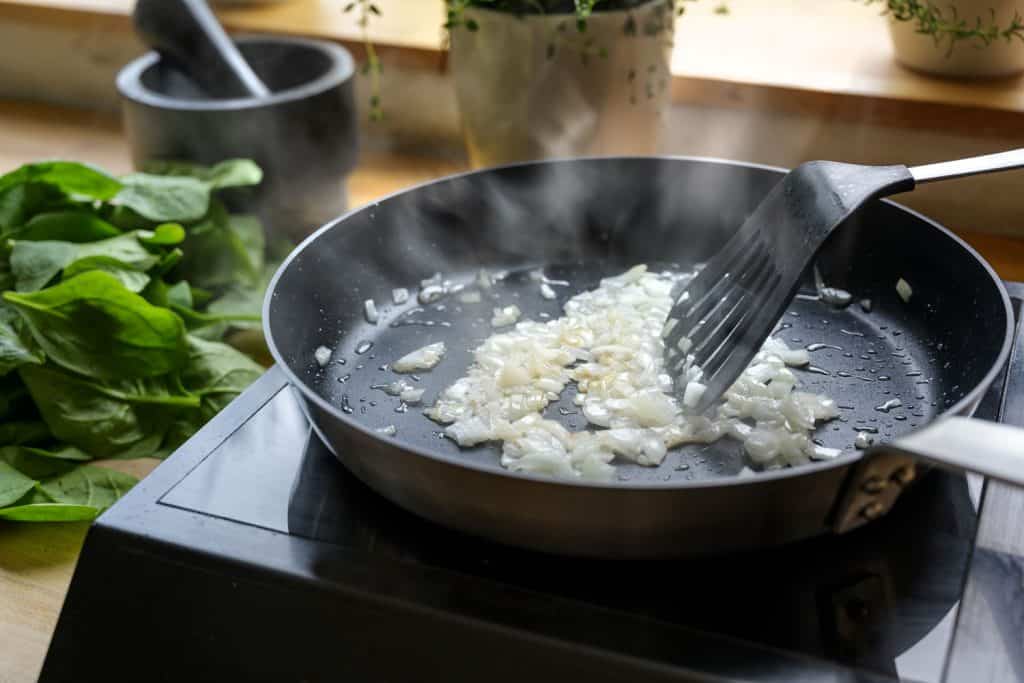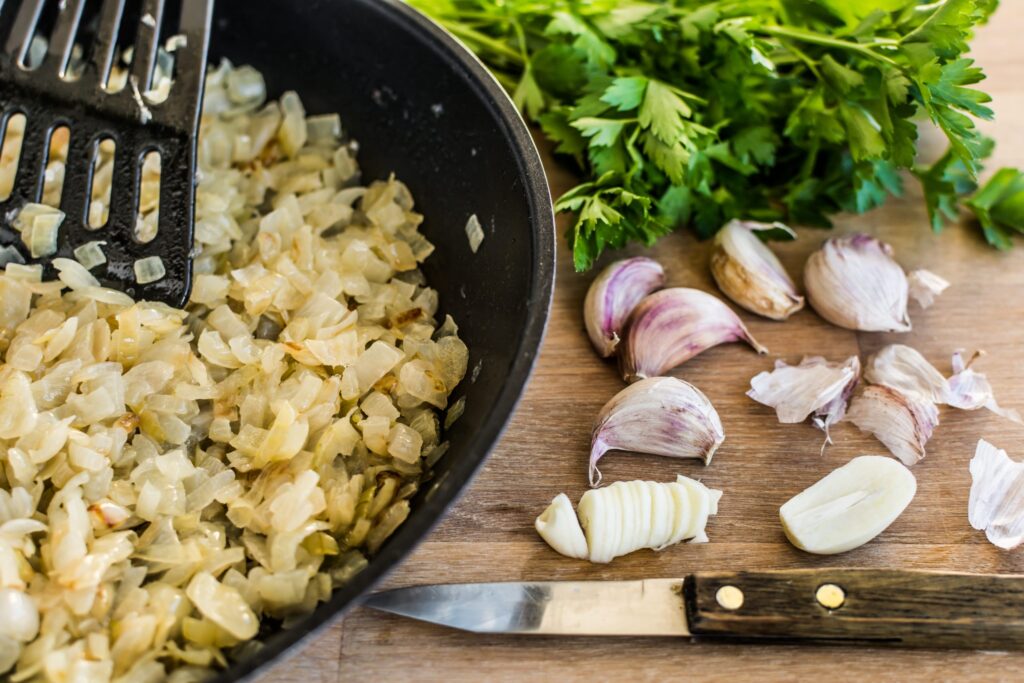Cooking onions can add delicious flavor to your dishes, but the strong odor they emit can sometimes be overwhelming. Here are some quick tips to help you cook onions without making your house smell too strongly of them:
- Cook in a well-ventilated kitchen or use exhaust fans.
- Opt for milder onions like sweet onions.
- Use a sharp knife and refrigerate or freeze onions before cutting.
- Cut onions under running water to reduce odors.
- Cook onions slowly over low heat and partially cover the pan.
- Cook with other aromatic ingredients to mask the smell.
- Consider using small kitchen appliances or cooking outdoors.
- Continue ventilating and clean surfaces to eliminate lingering odors.
- Use bowls of baking soda or coffee grounds to absorb odors.
Which Onions Should You Choose for Your Recipes?

Selecting the right type of onions for your recipes can make all the difference in flavor and texture.
Sweet onions for milder aroma:
Sweet onions, such as Vidalia, Walla Walla, and Maui onions, are known for their mild and sweet flavor. In addition, these onions have a lower sulfur content compared to other varieties, which contributes to their reduced pungency and milder aroma when cooked.
Moreover, when cooking dishes where a strong onion smell might be undesirable, consider using sweet onions as they impart a pleasant, subtle onion flavor without overwhelming the senses.
Other onion varieties and their odor levels:
- Yellow onions are the most commonly used variety and have a strong, classic onion flavor and aroma when cooked.
- White onions are milder than yellow onions but still have a noticeable onion scent.Red onions have a slightly sweeter and less pungent taste compared to yellow onions but can still release a distinct onion smell.
- Shallots are milder than most onions and have a delicate, nuanced flavor, making them a good choice for dishes where you want a more refined onion taste and aroma.
When selecting onions for a recipe, consider the specific aroma and flavor profile you want to achieve and choose the variety accordingly.
How to Expertly Prepare Onions for Your Meals?
Mastering the art of onion preparation is a fundamental skill in the kitchen
Using a sharp knife:
A sharp knife is essential when cutting onions to minimize cell damage and reduce the release of onion odors. However, dull knives can crush onion cells, leading to more intense aromas and potentially making you cry more when chopping onions.
In addition, regularly sharpen your kitchen knives to ensure precise and clean cuts, which help contain onion odors.
Refrigerating or freezing onions before cutting:
Cold temperatures can slow down the enzymatic reactions in onions that lead to the release of volatile compounds responsible for strong odors.
Furthermore, place the onion in the refrigerator or freezer for about 15 minutes before cutting to make the onion cells firmer and less likely to release strong odors. This method can be particularly helpful when dealing with very pungent onions.
Cutting onions under running water:
Running cold water while cutting onions can help trap and wash away some of the volatile compounds that produce the onion odor. Hence, the water helps create a barrier, reducing the dispersion of the onion smell in the kitchen.
Moreover, this method can be especially useful if you’re sensitive to onion odors or if you’re preparing a large quantity of onions.
What Are the Essential Cooking Techniques to Master?
When it comes to cooking, honing essential techniques can elevate your culinary prowess. Join us on a journey through the fundamental cooking skills that will empower you to create delicious dishes with confidence
Slow and low-heat cooking:
- Slow and low-heat cooking methods, such as caramelizing onions or simmering them in a stew, allow the onions to release their flavors gradually.
- Cooking onions slowly over low heat helps break down their sugars and reduce the pungency, resulting in a milder aroma.
- This technique is particularly effective for dishes where you want the sweetness of onions without the overpowering smell, like French onion soup.
Using a lid while cooking:
- When sautéing or frying onions, partially covering the pan with a lid can help contain the onion odors.
- The lid traps some of the aromatic compounds and prevents them from spreading throughout the kitchen.
- This method doesn’t completely eliminate the odor but can significantly reduce its impact, making it more manageable.
Cooking with other aromatic ingredients:
- Combining onions with aromatic ingredients like garlic, herbs (such as thyme or rosemary), or spices (such as cumin or paprika) can help mask the smell of onions.
- Aromatic ingredients contribute their own fragrances to the dish, creating a more complex and pleasing overall aroma.
- This approach is especially useful when cooking savory dishes like curries, where multiple flavors combine to create a balanced and enticing scent.
What Are The Alternative Cooking Methods?

Beyond the conventional stovetop and oven methods, explore a world of alternative cooking techniques that can add new dimensions to your culinary repertoire.
Using small kitchen appliances:
- Small kitchen appliances like slow cookers, instant pots, and toaster ovens are great options for cooking dishes that include onions with minimal odor dispersion.
- Slow cookers, in particular, allow for long, low-heat cooking, which reduces onion odors while infusing dishes with flavor.
- Instant pots can seal in aromas due to their airtight nature, making them ideal for minimizing onion odors.
- Toaster ovens are often placed away from the main kitchen area, so cooking with onions in one won’t permeate your living space with the smell.
- These appliances are especially useful when you want a convenient and low-odor way to prepare meals.
Cooking outdoors:
- If you have access to an outdoor grill or cooking area, consider using it for recipes that involve cooking onions.
- Outdoor cooking allows onion odors to dissipate quickly, so they don’t linger inside your home.
- Grilling onions in foil packets or skewers can add a smoky flavor without the overpowering kitchen aroma.
- This method is not only effective in reducing indoor odors but also adds a unique outdoor cooking experience to your meals.
FAQ’s
Does cooking onions reduce smell?
No, cooking onions does not reduce the smell; it can actually intensify the aroma during the cooking process.
How do you cook without smelling?
You can minimize cooking smells by using proper ventilation, cooking with lids, and employing odor-absorbing techniques like baking soda or activated charcoal.
How do you cut an onion to absorb smell?
Cutting an onion under running water can help trap and wash away some of the volatile compounds responsible for the onion smell.
What neutralizes onion taste?
To neutralize the taste of onions in a dish, you can use ingredients like acid (lemon juice or vinegar), sugar, or dairy products (cream or yogurt).
How do you neutralize garlic smell in the house?
To neutralize garlic smells in your house, open windows, use exhaust fans, and boil water with lemon or vinegar, which can help absorb and neutralize odors.
Why do I smell like onions after cooking?
You might smell like onions after cooking because the odor can cling to your clothes and skin. Washing your hands, changing clothes, and proper ventilation can help mitigate this.
Why put onions in vinegar?
Onions are often soaked in vinegar to pickle them. This preserves them, enhances flavor, and can make them less pungent.
Do onions leave a smell?
Yes, onions can leave a strong, lingering smell in your kitchen and on your hands, which is why various methods are used to control and mitigate their aroma.
Final Words
Cooking onions without overwhelming your home with their strong aroma is not only achievable but also essential for a more pleasant cooking experience. Selecting the right onion varieties, such as sweet onions, and implementing smart preparation techniques, like using a sharp knife and refrigerating onions before cutting, sets the stage for success.
When it comes to cooking, opting for slow and low-heat methods, using lids, and incorporating aromatic ingredients can significantly reduce the intensity of onion odors in your kitchen.
Ventilation and cleanliness play pivotal roles in mitigating lingering smells, and exploring alternative cooking methods, like outdoor grilling or using small kitchen appliances, provides additional options for odor control.
Lastly, deploying odor-absorbing techniques, such as baking soda and activated charcoal, adds an extra layer of assurance that your kitchen remains fresh and inviting. By integrating these strategies, you can savor the delightful flavors of onions without worrying about their overpowering scent, enhancing both your culinary endeavors and your overall kitchen environment.
